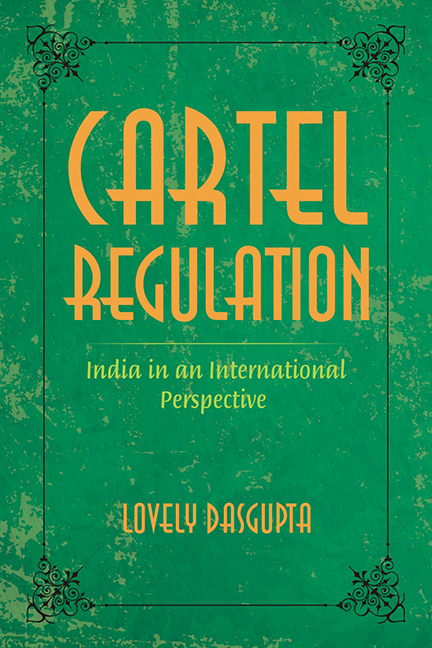Book contents
- Frontmatter
- Contents
- Preface
- Abbreviations
- 1 Introduction
- 2 Cartels: Understanding the Sum and Substance of the Concept
- 3 Cartels and Consumer Interests in the US
- 4 EU, Cartels and Consumer Interests
- 5 India, Cartels and Consumer Interests: The MRTP Phase
- 6 Cartels, Consumer Interests and India Post-MRTP Phase
- Conclusion
- Appendix 1
- Appendix 2
- Bibliography
- Index
1 - Introduction
Published online by Cambridge University Press: 29 November 2022
- Frontmatter
- Contents
- Preface
- Abbreviations
- 1 Introduction
- 2 Cartels: Understanding the Sum and Substance of the Concept
- 3 Cartels and Consumer Interests in the US
- 4 EU, Cartels and Consumer Interests
- 5 India, Cartels and Consumer Interests: The MRTP Phase
- 6 Cartels, Consumer Interests and India Post-MRTP Phase
- Conclusion
- Appendix 1
- Appendix 2
- Bibliography
- Index
Summary
Scope
This book is focused primarily on the interpretation and application of the anti-cartel provisions within the Competition Act, 2002. Although India had started on the path to industrialization and modernization soon after its independence from the British rule in 1947, to begin with and for quite some time it adopted and followed the so-called ‘mixed economic policy’ under which the state was the major player in industrialization and trade. Under this policy, very limited and restricted scope existed for the non-state actors to participate effectively and decisively in industrialization or international trade. In fact, the borders were not open for international investment or trade. Consequently, little or limited scope existed for free competition among private enterprises. Even then, precautions were taken in the Monopolies and Restrictive Trade Practices Act, 1969, against the misuse of freedom of trade by private actors. Nonetheless, the Monopolies and Restrictive Trade Practices Act was not geared to deal stringently with cartels. The reason was that the focus of the Act was to curb monopolies and dominant undertakings.
Accordingly, the anti-cartel provisions within the Monopolies and Restrictive Trade Practices Act were weak. Cartels were not prohibited per se; they were declared void only if they harmed public interest. Further, there was no mechanism for the detection of cartels. This was a major lacuna within the Monopolies and Restrictive Trade Practices Act, since cartels are usually secretive in nature. In the absence of any deterring substantive as well as procedural provisions, cartels thrived within the Indian economy. This is amply substantiated by the surveys conducted by CUTS (Consumer Unity and Trust Society). Moreover, writers have extensively analysed the provisions of the Monopolies and Restrictive Trade Practices Act and highlighted the weaknesses within the Act. Specifically, it is evident from their writings that the Monopolies and Restrictive Trade Practices Commission had failed to take any concrete steps against cartels. At the beginning of the last decade of the last millennium, specifically in 1991, India changed its path by introducing the so-called ‘new economic policy’.
The new economic policy, which replaced the mixed economy by a market economy, opened up and encouraged participation in industrialization and trade not only to domestic enterprises but also to foreign ones. India also opened its international borders for cross-border trade.
- Type
- Chapter
- Information
- Cartel RegulationIndia in an International Perspective, pp. 1 - 11Publisher: Foundation BooksPrint publication year: 2014



